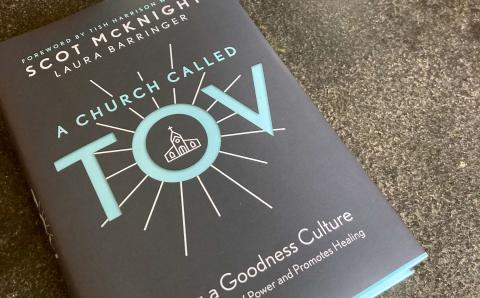Mrs. Bassett changed my life for the good, and she wasn’t even my sixth-grade teacher. As she was teaching my husband Doyle’s sixth-grade class at Twin Lake Elementary School near Muskegon, Mich., I was attending Grade 6 at my neighborhood elementary school in Winnipeg, Man., Canada, 1,000 miles away.
Yet this compassionate soul was powerfully influencing my future husband in ways that still ripple in our present lives. Etched into Doyle’s life is the day she took him aside privately in the hallway and spoke words that sank deep into his future. “You know,” she said kindly, “you can always come to me for help anytime.” Doyle was shocked. He thought she was going to scold him for giving himself good marks on his self-graded and undone homework. He had just bombed his last test, and he was scared he would be in trouble with his parents if they found out. School was a relentless grind for him. A fifth-grade teacher who humiliated him in front of the class for his “slowness” had stamped him with feelings of worthlessness. Enter Mrs. Bassett with a gentle nudge in the right direction. It changed everything for Doyle (and for me and our kids). He didn’t actually ask her for help very often, but suddenly he felt that if he tried, he could complete his work and do better on his tests. Doyle ended up graduating from high school with honors and completing a Bachelor of Science in biology.
It just goes to show that young people carry what they are taught at a tender age throughout the rest of their lives. We are shaped by our teachers. Whether it’s a favorite Sunday school teacher, a teacher in public or Christian school, or a college professor, our teachers inspire, motivate, and encourage us in profound ways. Teachers have the most important job in the world because they have the power to change lives.
I think of my high school Bible teacher, Mr. Peters, who always taught his Grade 12 students the book of Amos, still my favorite Old Testament book. Or my journalism professor, the refreshingly iconoclastic Professor Haines at Moody Bible Institute, who brought in guest speakers from Rolling Stone magazine and one day looked me in the eye and told me that I could make a living as a writer someday. But it is probably Mrs. Derksen, my childhood Sunday school teacher at McIvor Avenue Mennonite Brethren Church, whose love and example have embedded her most deeply in my soul. More than the Sunday school curriculum I remember her personal testimony, which she shared in almost every class. She was raised in a Mennonite colony in Chortitza, Ukraine, during Joseph Stalin’s holocaust and suffered the loss of her father, who was taken in the night to be tortured and killed in a Soviet gulag. Her faith shone brightly as she regaled her 10-year-old students with stories of her life as a child of war, a teenage refugee, and then an immigrant to what she called “the great country of Canada,” a country she gave thanks for every class.
When she died in 2016, I was unexpectedly emotional. This humble lady with painful arthritis embodied a mighty faith. She wasn’t just a Sunday school teacher; she was a role model for a lifetime.
Which teacher has had a lasting influence on you? When we asked some of our Banner editors and contributors for stories about their favorites, they did not disappoint. As you think about those teachers who left their imprint for good in your life, pull up a chair (or slide into a desk) as you listen to stories of teachers whose words, example, and direction still hold sway years later.
James Forrest, Ph.D., Professor of English Literature
By Shiao Chong
I had only one university course with James Forrest, Ph.D., now deceased, but he made a huge impact on me. Forrest was a Scotsman with white hair, white eyebrows, and a serious, wrinkled face. He gave lectures on Shakespeare that were old-school and boring to some but crammed with substance. He had a dry wit coupled with a no-nonsense demeanor. Once, after a rather arrogant young student rambled on about his opinion in class, Forrest slowly remarked with a poker face, “Thank you, Mr. X. Unfortunately, that was total BS. Eloquent, but BS nevertheless.”
I took his advice to read Shakespeare’s plays aloud to myself, as they were originally meant to be heard. One day, sitting at a study table in the English department, I was immersed in reading Othello, aloud but under my breath. Suddenly I realized someone was standing behind me. I turned and saw Forrest peering over my shoulder. He smiled and said, “Good for you.” And he walked away without another word. I think that was the only time I saw him smile.
I will never forget one great insight he taught us from Shakespeare’s tragedies. Forrest taught me that sometimes our virtues and strengths, the very things that we rely on to be successful, can be our undoing in certain scenarios. And that’s why it’s tragic. “Read the Bible’s book of Job,” Forrest said, “if you want to understand tragedy.” It was a life lesson for me.
Mr. Kamphuis, Grade 9 Geography
By Micah van Dijk
I began Grade 9 at a Christian high school, petrified of standing out and being uncool. My faith was the last thing I wanted to talk about in front of my friends. My homeroom geography teacher was supposed to give a 10-minute devotional at the beginning of each class. His devotions often lasted 30 minutes or more.
We quickly learned that a few years earlier Mr. Kamphuis had been a “stale” Christian even while going to church and teaching at a Christian school. He simply went through the motions and nothing more. Then he experienced a reawakening that showed him how “dead” his life was and how exciting following Jesus really could be.
I did my best to act uninterested and “cool” during these devotions. However, I was surprised by Mr. Kamphuis’ boldness and intrigued to learn more. I secretly valued the spiritual reflection activities he would have the class do. I didn’t want my classmates to see, but I felt empty and wanted to be filled. I craved the love and acceptance that Mr. Kamphuis explained Jesus could give.
Mr. Kamphuis was vulnerable and passionate. His devotions showed me that faith was more than going to church or knowing the right answers in Bible class. I was still petrified of being uncool at school. But I began to see that neither Mr. Kamphuis nor Jesus cared if I was cool or not.
Rodger Rice, Ph.D., Professor of Sociology
By Michelle Loyd-Paige
I have three degrees in sociology—a B.A., an M.S., and a Ph.D. I can honestly say that if I had not taken Sociology 151: Introduction to Sociology with Rodger Rice, I likely would not have studied sociology, attended graduate school, or had an academic career at what is now Calvin University. I loved that class. It helped me to make sense of the world in ways that would shape who I am today. Rice became my adviser for my undergraduate work. He encouraged me to think about attending graduate school. He attended my wedding. When he found out I was back in the area working on my dissertation, he persuaded me to teach a class on my dissertation topic for a January term in 1985. Teaching that course was the beginning of a 36-year career at Calvin. It was a bit of a surreal moment when our relationship moved from professor and student to colleagues in the same department. Years later we would even co-author a book. Rice is still in my life, though we do not see each other often. But when he comes to campus for an event, we quickly begin catching up. He has always looked out for me and encouraged me. I am beyond grateful for his mentorship and friendship.
Mr. Ward, high school teacher
By Andrew Zwart
My favorite high school teacher, Mr. Ward, wasn’t my favorite at the time. He wasn’t the funny or cool teacher.
What has stuck with me is Mr. Ward’s clear and charitable thinking. Every time he raised an issue, he presented the best arguments for all sides. He admitted his own uncertainties about complex questions. In essence, he taught our class never to settle for the too-easy answer.
On one occasion, a few of us were discussing a popular movie. When we asked for his opinion, he unexpectedly asked in a gentle and warm tone why the movie needed to include a sex scene even if it wasn’t explicit. What message did the scene send its audience? What did it tell us about popular entertainment? These questions stopped me in my tracks. I would never even have thought to ask them.
That’s why Ward became my favorite teacher years later, when for the first time I found myself thinking, “I wonder what Mr. Ward would make of this.” I suddenly felt grateful for the faith it took for him to believe that one day the squirrely teens in front of him might make good on the tools he gifted us. And now in my own classroom I aspire, however imperfectly, to his example: to ask questions, to listen carefully, to teach in such a way that the cross is always plainly in view.
The Teacher I Never Had
By Carol Bremer-Bennett
The favorite teacher I never had looked like me. She moved through the worlds of Indigenous knowledge and Western education with fluidity and honored both. She taught me how to stand tall in the footsteps of my ancestors and to walk humbly on paths that might take me further than they had ever traveled. This teacher spoke my language, the spoken language of my people, the Diné (Navajo), and also the felt language of my heart. She knew God as the creator of this incredible world, understood that Jesus redeemed brokenness throughout generations of trauma, and breathed in deeply the Holy Spirit.
The teacher I never had connected the past, present, and future in a circle, not a line marching forward without dimension. She rejoiced in the humor of the world and brought laughter into the learning spaces. She taught me only enough to keep me curious so that I would continue to seek answers to my questions. In this way she gave me more than she could carry, and she instilled confidence and courage within me. She affirmed me and saw another Indigenous woman who would pass on this elder knowledge to future generations.
In all my years of formal education, from preschool through my Master’s in Education, I have never had a teacher who was Indigenous. This is a sorrow I carry, one I did not want other Indigenous children to experience, so I became the favorite teacher I never had myself. I pray that all my students, some who are now teaching in the classroom where I once stood, are now traveling further than I could take them.
Mr. Spencer, Headmaster
By Colin Watson
At about age 8, I was attending an Anglican elementary school, All Saints Anglican, in New Amsterdam, British Guiana. The year was 1960. Several classes met on church grounds in a large hall with minimal partitions, creating a cacophony as teachers raised their voices to compete with other teachers. Our class size was about 35. Even before the end of the school year, my teacher called my father and discussed my overall progress. I had placed 31st in the overall standing for that term. I was clearly not thriving. Mr. Davis recommended a change of school, and my parents agreed.
Enter Mr. Spencer, the headmaster of St. Aloysius Boys School, a Catholic school in the same small town. From my first day, Mr. Spencer made me feel at home. He made me feel as if I could succeed. I don’t recall his words, but I definitely recall feeling special. He placed me under the care of one of his teachers for the rest of that year. I exhibited remarkable academic improvement by the end of the year. Mr. Spencer selected me to be a member of a class that he personally taught for the next year, and I felt as if I had found a new family. There was warmth, acceptance, love, and significant challenge. I carry the memories of this faith-filled, love-in-action environment with me to this day.
If we as children of God are placed in a loving and supportive environment, we can excel in ways preordained by God—ways often much greater than the lower expectations we humans often have for each other.
About the Author
Lorilee Craker, a native of Winnipeg, Man., lives in Grand Rapids, Mich. The author of 16 books, she is the Mixed Media editor of The Banner. Her latest book is called Eat Like a Heroine: Nourish and Flourish With Bookish Stars From Anne of Green Gables to Zora Neale Hurston.








